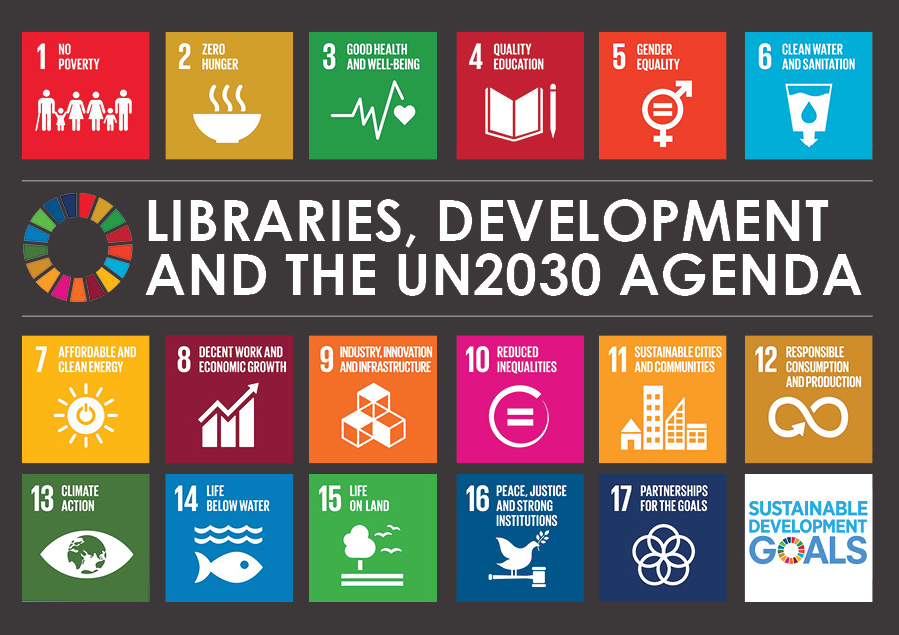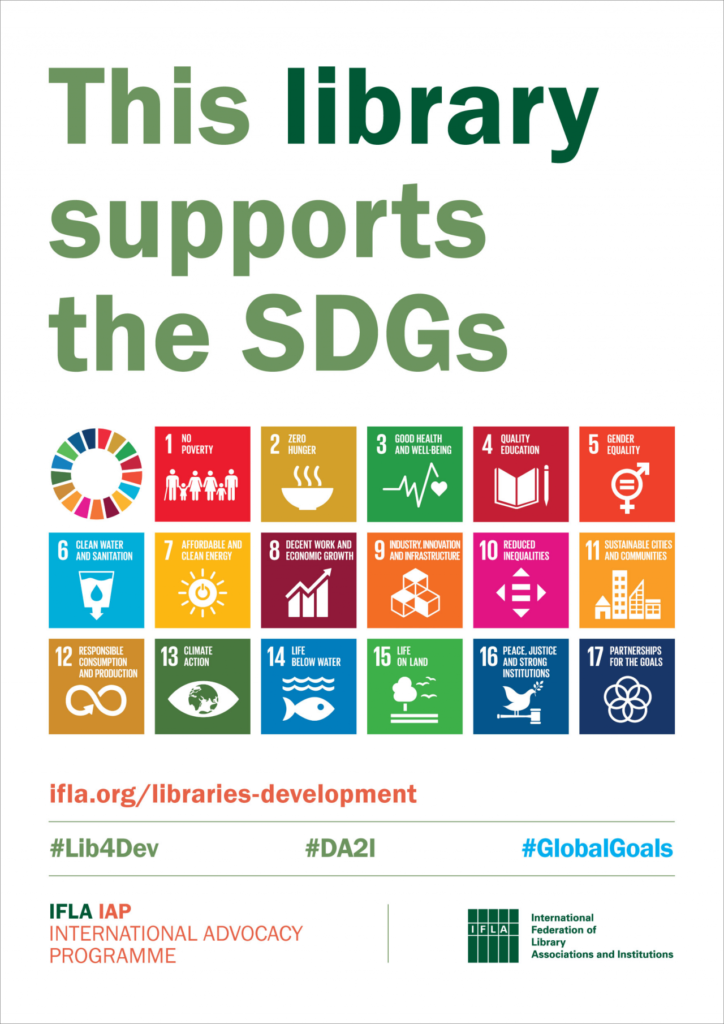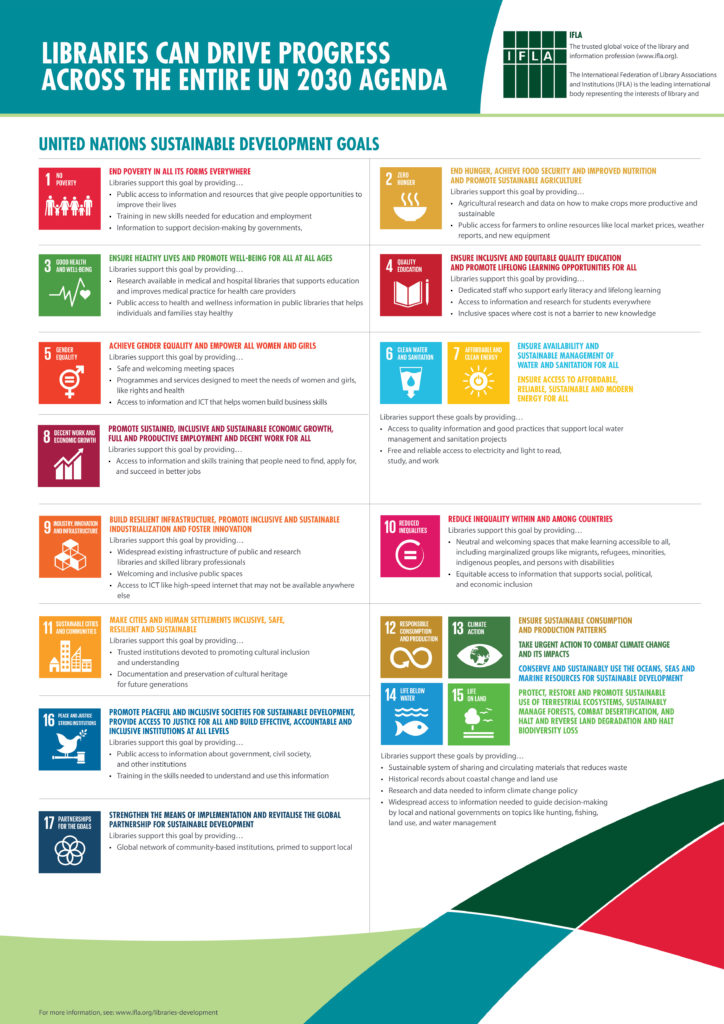Take Action!
Take action now so that libraries have a say. Everyone in the library community and beyond can help promote the role of libraries as supporters of development, with the Sustainable Development Goals providing an excellent framework for this work.
While IFLA may be able to support, how far you go in underlining the role of libraries is up to you. You will also need to take the lead in understanding the landscape of decision-making around SDG implementation, and how to engage effectively.
How to get involved?
- Use the SDGs as a framework for thinking about your contribution to development: look through the 17 goals – and the 169 targets – and think about how your work helps to deliver these.
- Think also about how you can explain this contribution to others, in a clear and convincing way – your idea could become an SDG Story!
- Advocating with government decision-makers is essential now to secure recognition for the role of libraries as engines of development – in key policy and strategy documents (such as national development plans), and to ensure that libraries receive the resources needed to continue this work.
- Take part in Voluntary National Reviews: every few years, countries prepare and submit a review of their work to implement the SDGs. This offers an opportunity both to create connections, and to highlight the work of libraries. See our page on Voluntary National Reviews for more.
- Raising awareness in the library community and beyond (through events, social media, websites, blogs, mailing lists) to show libraries’ contribution to development. You can download and adapt our presentation about libraries, information and the SDGs, as well as using other resources on our website.
Helpful Resources
The International Advocacy Programme (IAP), run between 2016 and 2018, supported IFLA’s members and the broader library field in engaging in policies for economic, social and cultural development. The IAP page of our website explains more about this work, and the resources available to us.
In particular, take a look at our toolkit, booklet, and handout to support you in your advocacy and awareness-raising activities:
- Use the toolkit for background on the UN 2030 Agenda and to plan your advocacy;
- Create a delegation in your country to carry out advocacy work. Make sure to involve the national association and the national librarian as key influential partners in this initiative;
- Use the booklet and handout – or adapt/translate them to your situation (following IFLA’s Branding Guidelines) – as documents you can take to meetings to give to government officials or coalition partners, or to raise awareness and engagement within your association or institution;
- Adapt, reuse and translate a set of PowerPoint slides about libraries, the UN 2030 agenda and the SDGs, updated in 2022. See also our previous editions, in Arabic, English, French and Spanish.
- Create your own UN 2030 Agenda dissemination materials following UN guidelines for Non-UN Entities.
- Get involved in SDG Action Week each September – see our Get Into guide for more.
Delivering on a commitment in the Lyon Declaration on Access to Information and Development, IFLA in partnership with the Technology & Social Change Group (TASCHA) at the University of Washington Information School, launched the first Development and Access to Information (DA2I) report at the United Nations High Level Political Forum 2017. A second was issued in 2019, with a third planned for 2023.
The reports are designed as an advocacy tool to demonstrate the invaluable contribution that information access, particularly through libraries, makes to promoting more socially and economically inclusive societies, and to track progress over time. Learn more about DA2I and how you can use it to help you advocating for libraries in development!
Stay in touch
- Share news about advocacy and awareness-raising activities going on in your country using the #Lib4Dev and #DA2I hashtags.
- Follow IFLA on Twitter and Facebook, to be up to date with our advocacy work
- Contribute with stories of how libraries further development by submitting your story to the IFLA Library Map of the World SDG Stories section. Make sure to use the “Libraries and the Sustainable Development Goals: a storytelling manual“ to prepare it!
- Send us any news or updates on libraries and development in your country: ifla@ifla.org
- Stay tuned to the events announcements to discover if there are any activities near you.
Communication materials

Banner
- English [JPEG]

Guidelines
- UN Communications Materials for Use by Non-UN Entities (Arabic, Chinese, English, French, Russian, Spanish)
- The Global Goals Resources (English)
- Guidelines on IFLA Branding (English, Spanish, French, German)
